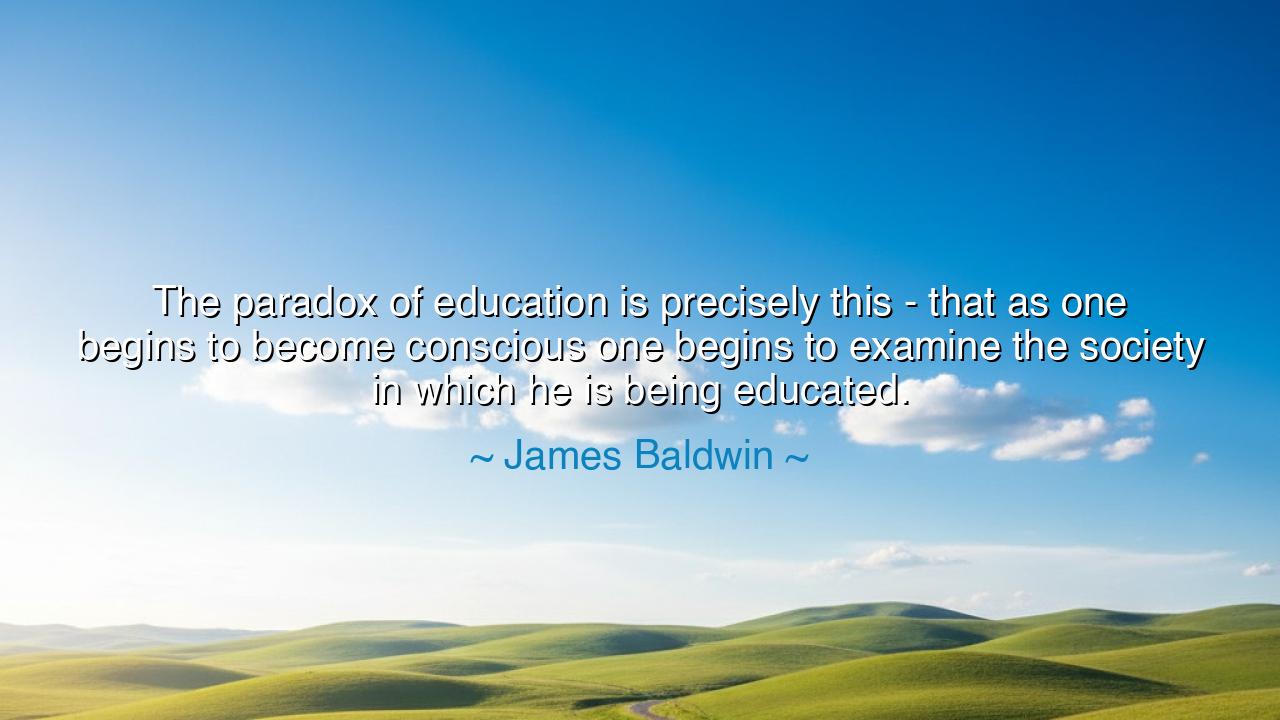
The paradox of education is precisely this - that as one begins
The paradox of education is precisely this - that as one begins to become conscious one begins to examine the society in which he is being educated.






There is great truth wrapped in paradox within the words of James Baldwin, for he spoke not only of education but of awakening itself. When he declared, “The paradox of education is precisely this — that as one begins to become conscious one begins to examine the society in which he is being educated,” he uncovered a universal tension between knowledge and conformity, between awareness and obedience. Education, in its purest form, was meant to free the mind — yet too often, it is used to shape the mind to serve the structures of power. Baldwin saw that the moment one truly becomes conscious, one cannot help but question the very system that shaped him.
In ancient times, this paradox was known well to the philosophers of Greece. Socrates, through his relentless questioning, was condemned to death by the very city that claimed to honor wisdom. His “crime” was awakening others to their own ignorance — to make them conscious of the shadows on the wall. Athens had educated him, but once his mind saw beyond its illusions, he became dangerous to it. Thus Baldwin’s insight echoes across the ages: the more a man learns to think, the more he begins to see — and what he sees may not please those who taught him.
This truth repeated itself through every age of reform and revolution. Consider Frederick Douglass, born into slavery yet taught himself to read in secret. Through the forbidden act of education, he gained consciousness of his bondage — not merely physical, but moral and spiritual. The more he learned, the more unbearable his condition became, until knowledge itself compelled him toward freedom. Education gave him the power to question, and in questioning, he rebelled. Baldwin, a descendant of that same struggle, knew that every awakening begins as an act of defiance against the limits set by society.
The paradox of education also speaks to the inner journey of the soul. For to awaken one’s mind is to disturb one’s peace. The comfort of ignorance must be traded for the burden of understanding. A child learns the laws of his land, but as he matures, he begins to perceive the injustices that those laws may conceal. The very lessons that were meant to civilize him become the seeds of his unrest. This is why Baldwin warned that true education cannot be neutral — it either liberates or conditions the spirit.
In modern times, we see this paradox unfold in every generation that rises to challenge the status quo. Students who learn of liberty begin to ask why liberty is not equally shared. Citizens who study history begin to see how it has been written to serve the victors. Artists who are taught the forms of beauty begin to break them, searching for truth beyond tradition. In each case, consciousness turns education into revolution. The classroom becomes the battlefield of the mind.
Yet Baldwin did not speak these words in despair, but in hope. He believed that education must lead to moral responsibility — that once the eyes are opened, one must act with courage and compassion. Awareness without action is decay; consciousness without conscience is chaos. The purpose of learning, then, is not to serve society as it is, but to help shape what it might become. The educated man or woman must become a builder of new truths, a reformer of old wrongs.
Let this, then, be the lesson for those who seek wisdom: Do not fear the discomfort of awakening. To question one’s world is not betrayal, but fidelity to truth. Read deeply, think freely, and when knowledge opens your eyes, do not close them again out of convenience. The world will resist your vision, but the soul must persist in its clarity. For the highest aim of education is not the making of servants, but the making of free and conscious beings.
Thus, as the ancients would say — the true scholar is also the true rebel. And every act of awakening, every moment of consciousness, is an act of creation. To be educated, in the truest sense, is to become light in a world that fears illumination. And though that light may cast shadows upon all that was once comfortable, it is only by its glow that mankind finds the path to justice, freedom, and the fullness of its own humanity.






AAdministratorAdministrator
Welcome, honored guests. Please leave a comment, we will respond soon